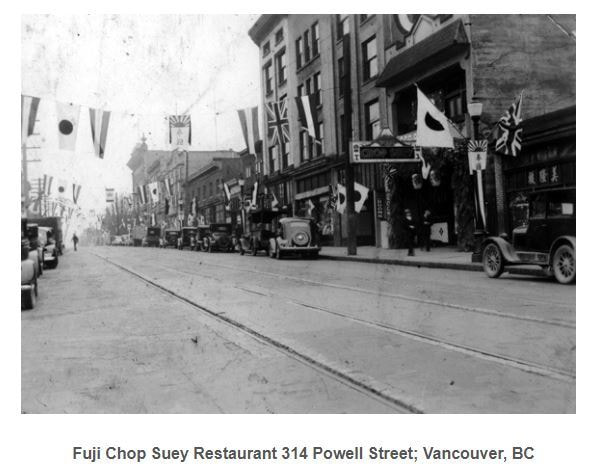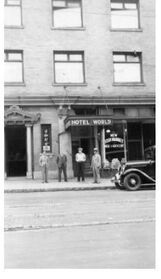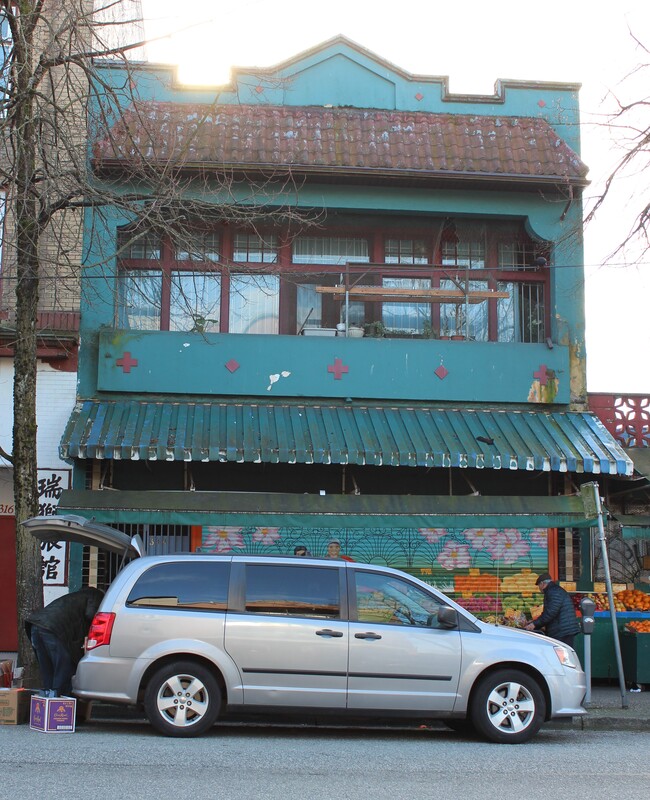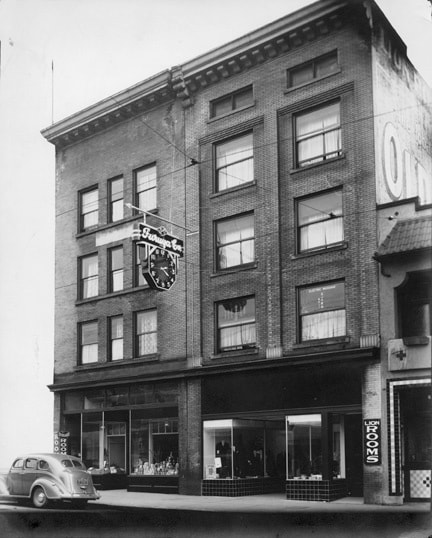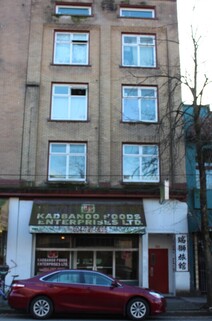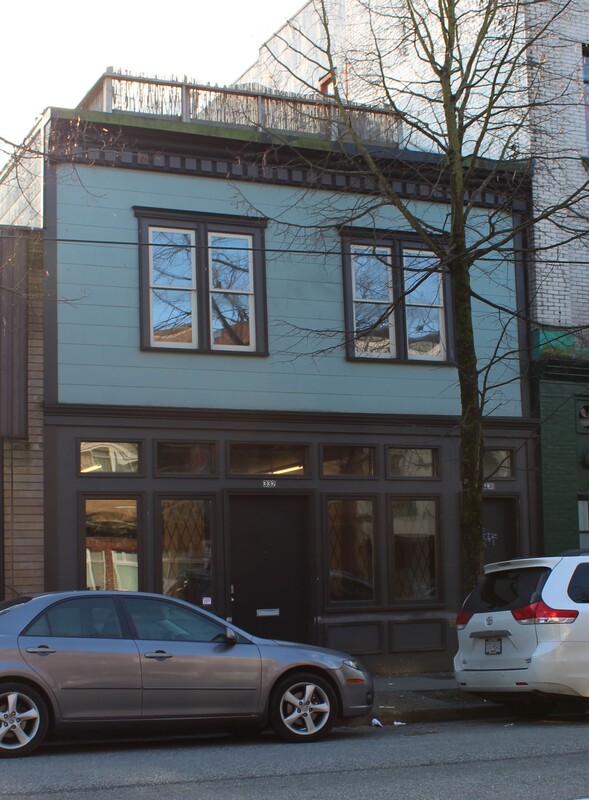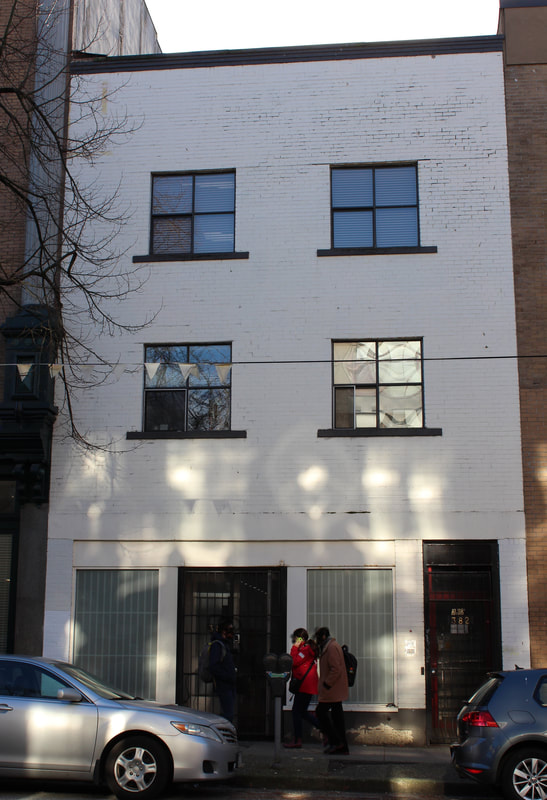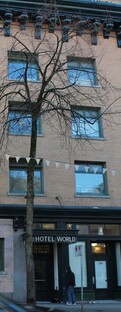Audio
Interviews
Oral History
There are seven groups of audio interviews done by the Landscapes of Injustice Oral History cluster.
- Mr. Wakabayashi takes the interviewers on a building-by-building tour of the 300 block of Powell Street.
- Japanese Canadians describe their childhoods in the Powell Street neighbourhood before the uprooting.
- Japanese Canadians and non-Japanese Canadians recount Acts of Ownership: what Japanese Canadian families did when they were faced with the possibility of losing their belongings.
- Japanese Canadians recall how their families reacted to dispossession.
- Japanese Canadians and non-Japanese Canadians describe Legacies of Loss: the losses faced when Japanese Canadians were forced out of coastal British Columbia.
- Japanese Canadians describe the Legacies of Silence: how many families did not talk about the internment era.
- Japanese Canadians talk about Inherited Belongings: special items left to them by their parents and grandparents.
Powell Street Interviews
These interviews are with Tadao Wakabayashi who takes the interviewers on a building by building memory tour of the 300 block of Powell Street. The interview was conducted in 1990. Nikkei National Museum 1996.166.9.a-c
314 Powell Street
Tadao Wakabayashi tells the interviewers about 314 Powell Street. It used to be a resturaunt called Fuji Chop Suey, which had a dining room and banquet hall. Tadao recalls dancing in living rooms and at Fuji Chop Suey before the uprooting.
316 and 318 Powell Street
Tadao Wakabayashi tells the interviewers that the Lion Hotel was at 318 Powell Street. Behind the building, he explains was an ofuro (a Japanese public bath) and an archery room.
332 Powell Street
Tadao Wakabayashi tells the interviewers that at 332 Powell Street there was a Japanese Canadian owned café and Kato Shoes, which repaired shoes and sold new shoes.
382 Powell Street
Tadao Wakabayashi explains that 382 Powell Street housed the Sukamoto Rooming House (where millworkers lived), Shubuya Ladies’ Wear clothing store, and a gambling parlour.
396 Powell Street
Tadao Wakabayashi explains that at 396 Powell Street there was a rooming house called World Hotel. Next door, he explains, was a grocery store and a Japanese Canadian owned bank.
435 Powell Street
Tadao Wakabayashi tells the interviewers that at 435 Powell Street there was a confectionary store and ofuro (Japanese public bath.)
Union Fish, Nabata Taxi, and bottled milk
Tadao Wakabayashi points to a corner where there used to be several Japanese Canadian owned businesses. There was a fish market called Union Fish, Nabata Taxi, and a confectionary store that sold milk on the side.
Alleyway, tofu factory
Tadao Wakabayashi brings the interviewers to an alleyway where his family ran a tofu factory before the uprooting.
Powell street neighbourhood before the uprooting
Various Japanese Canadians talk about what the Powell Street neighbourhood was like when they were children, before the war.
Home at 656 Cordova
Betty Toyota (b. 1925) describes the home that she grew up in. She talks about her parents, her siblings, speaking Japanese at home, and attending elementary school nearby. She describes attending Japanese language school after the regular school day.
Excerpt from Landscapes of Injustice oral history interview with Betty Toyota and Joy Trapnell.
1941: Disruption of education
Betty Toyota (b. 1925) talks about school, her classmates, and how her life changed after Canada declared war against Japan. She recalls passengers on the bus harassing Japanese Canadians. She describes being unable to attend her graduation in 1942 because of the curfew imposed on Japanese Canadians and how a friend picked up her diploma for her.
Excerpt from Landscapes of Injustice oral history interview with Betty Toyota and Joy Trapnell.
Nancy Morishita's home on Cordova
Nancy Morishita (b. 1920s) describes the home that she grew up in in the Powell Street neighborhood. She describes the house in detail, walking to school, and spending whole Saturdays at the movie theatre.
Excerpt from Landscapes of Injustice oral history interview with Nancy Morishita.
Friends and playing around Powell Street
Nancy Morishita (b. 1920s) describes her classmates and riding a bicycle, jumping rope, and playing around the Powell Street neighbourhood.
Excerpt from Landscapes of Injustice oral history interview with Nancy Morishita.
Playing in the alleyways
Tadao Wakabayashi talks about playing in the alleys behind Powell Street as a child.
Nikkei National Museum 1996.166.9.a-c
Acts of Ownership
Japanese Canadians and non-Japanese Canadians talk about what Japanese Canadian families did when they were faced with the possibility of losing their belongings.
“At least he had cash”
Betty (b. 1925) recalls her father’s quick-thinking in 1942. He withdrew his money from his bank accounts and insurance policies and gave the cash to Betty’s mother, who used it throughout the internment years.
Excerpt from a Landscapes of Injustice oral history interview with Betty Toyota and Joy Trapnell.
Packing tools, pots, and mattresses
Betty (b. 1925) describes the belongings that her family sold and packed in 1942. Her daughter, Joy, exclaims that she still has the frying pan that they brought with them.
Excerpt from a Landscapes of Injustice oral history interview with Betty Toyota and Joy Trapnell.
Moving into a house left by Japanese Canadians
Eileen (b. 1936) describes renting a home in the 1940s that had been a Japanese Canadian owned home. She recalls the belongings the owners left behind and finding hidden belongings in the walls. She also recalls government officials taking belongings from homes in Steveston and taking a sewing machine from another house for her mother.
Excerpt from Landscapes of Injustice oral history interview with Eileen Carefoot.
Packing an electric train
Elmer (b. 1933) recalls when his family was uprooted in 1942, and his mother told him to take what he would like and not worry about clothing. He packed his electric train and other toys.
Excerpt from Landscapes of Injustice oral history interview with Elmer Hara.
Casting a samurai sword into Burrard Inlet
Jeanne (b. 1932) describes her mother’s refusal to have her family’s samurai sword seized by the government or vandals and decision to cast it into Burrard Inlet in the dead of night.
Excerpt from a Landscapes of Injustice oral history interview with Jeanne Ikeda-Douglas.
Reactions to Dispossession
Japanese Canadians talk about how their families reacted to dispossession.
“His boat was his wife”
Betty (b. 1925) recalls the seizure of fishing vessels in the winter of 1941/1942. She recounts a young fisherman crying when he saw his fishing boat rotting: “I remember him coming over one night just crying, he said his boat was his wife.”
Excerpt from a Landscapes of Injustice oral history interview with Betty Toyota and Joy Trapnell.
Receiving cheques from the Office of the Custodian
Betty (b. 1925) describes her father’s attitude toward the government’s seizure of property and his dispossession. She recalls when he received the cheque for his property and, in anger, “started to tear the cheque.” She recalls how when one of her friends’ fathers received his cheque, he broke down and cried.
Excerpt from a Landscapes of Injustice oral history interview with Betty Toyota and Joy Trapnell.
“… this gentlemen got a letter, and he started crying!”
Yeiji (b. 1925) recounts seeing a man burst out crying in public when he received the cheque for his six fishing boats.
Excerpt from Landscapes of Injustice oral history interview with Yeiji Inouye.
Legacies of Loss
Japanese Canadians and non-Japanese Canadians talk about the losses faced when Japanese Canadians were forced out of coastal British Columbia.
Loss of Community
Harold (b. 1937) reflects on what Steveston would have been like if Japanese Canadians had not been uprooted. He says that the life of a community was disrupted with the uprooting and dispossession.
Excerpt from Landscapes of Injustice oral history interview with Harold Steves.
Loss of Pets and Home, Part 1
Midori (b. 1927) recalls that the “saddest thing was leaving our cat.”
Excerpt from a Landscapes of Injustice oral history interview with Midori Bruns.
Loss of Pets and Home, Part 2
Midori (b. 1927) reflects on the loss of the beautiful home her father had built for her family and says that the hardest thing was leaving her pets.
Excerpt from a Landscapes of Injustice oral history interview with Midori Bruns.
Loss of Education and faith in Canada, Part 1
Yoshiaki (b. 1928) recalls the federal and provincial governments’ failure to provide education in the internment camps and his decision – out of anger at the government – to end his schooling. He expresses regret at his decision.
Excerpt from Landscapes of Injustice oral history interview with Yoshiaki Nagao.
Loss of Education and faith in Canada, Part 2
Yoshiaki (b. 1928) describes his experience grappling with the internment as a teenager and how he still tries not to think about it. “It’s too big,” he says.
Excerpt from Landscapes of Injustice oral history interview with Yoshiaki Nagao.
Legacies of Silence
Japanese Canadians describe how many families did not talk about the internment and dispossession.
Shigata ga nai, “it can’t be helped”
Isabel (b. 1915) discusses the silence of the Issei (or first generation Japanese Canadians) about their internment experiences.
Excerpt from Landscapes of Injustice oral history interview with Isabel Hiroto.
“She was always very bitter about it”
Bruce (b. 1949) describes his mother’s silence and bitterness about the dispossession and growing up not knowing how strongly the sale of the family home impacted his family.
Excerpt from Landscapes of Injustice oral history interview with Bruce Yoneda.
Inherited Belongings
Japanese Canadians talk about special items left to them by their parents and grandparents.
The buried Japanese sword
“David (b. 1954) tells the story of his grandfather’s “wakizashi,” which he calls a “prized item.” He describes how his family buried it in 1942 and retrieved it after internment ended. He recalls bringing the small samurai sword to show-and-tell.
Excerpt from Landscapes of Injustice oral history interview with David Mitsui.

